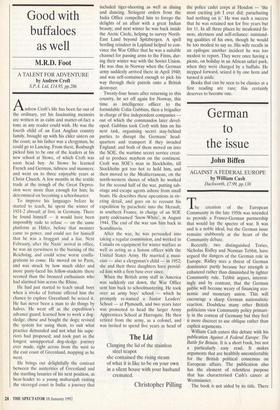Good with buffaloes as well
M.R.D. Foot
A TALENT FOR ADVENTURE by Andrew Croft S.P.A. Ltd, £14.95, pp.286 Andrew Croft's life has been far out of the ordinary, yet his fascinating memoirs are written in as calm and matter-of-fact a tone as any reader could wish. He was the fourth child of an East Anglian country family, brought up with his elder sisters on the coast; as his father was a clergyman, he could go to Lancing. From there, Roxburgh picked him to be one of the leaders at his new school at Stowe, of which Croft was soon head boy. At Stowe he learned French and German, tidiness and manners; and went on to three enjoyable years at Christ Church. A few months in the textile trade at the trough of the Great Depres- sion were more than enough for him; he determined on becoming a schoolmaster.
To improve his languages before he started to teach, he spent the winter of 1931-2 abroad; at first, in Germany. There he found himself — it would have been impossibly rude to refuse — on the same platform as Hitler, before that monster came to power, and could see for himself that he was a braggart and a liar. Next February, after the Nazis' arrival in office, he was an eyewitness to the burning of the Reichstag, and could sense worse confla- grations to come. He moved on to Paris, atid was struck by how much older and more pasty-faced his fellow-students there seemed than the bronzed enthusiasts who had alarmed him across the Rhine.
He had just started to teach small boys when a stroke of fortune offered him the chance to explore Greenland: he seized it. He has never been a man to do things by halves. He went off as the expedition's advance guard; learned how to work a dog- sledge; chose and bought the dogs; revised the system for using theib, to suit what practice demanded and not what his supe- riors had proposed; and took part in the longest unsupported dog-sledge journey ever made, right across from the west to the east coast of Greenland, mapping as he went.
He brings out delightfully the contrast between the austerities of Greenland and the startling luxuries of his next position, as bear-leader to a young maharajah visiting the viceregal court in India: a journey that Included tiger-shooting as well as dining and dancing. Stringent orders from the India Office compelled him to forego the delights of an affair with a great Indian beauty; and next winter he was back inside the Arctic Circle, helping to survey North- East Land beyond Spitzbergen. A spell herding reindeer in Lapland helped to con- vince the War Office that he was a suitable channel for passing arms to the Finns, dur- ing their winter war with the Soviet Union. He was thus in Norway when the German army suddenly arrived there in April 1940; and was self-contained enough to pick his way through their patrols onto a British destroyer.
Twenty-four hours after returning to this country, he set off again for Norway, this time as intelligence officer to the formidable Cohn Gubbins, then a brigadier in charge of five independent companies out of which the commandos later devel- oped. Gubbins took Croft with him on his next task, organising secret stay-behind parties to disrupt the Germans' head- quarters and transport if they invaded England; and both of them moved on into the SOE, the wartime secret service creat- ed to produce mayhem on the continent. Croft was SOE's man in Stockholm, till Stockholm got too hot to hold him, and then moved to the Mediterranean, on the north-western shores of which he worked for the second half of the war, putting sab- otage and escape agents ashore from small boats. He describes these operations in riv- eting detail, and goes on to recount his expedition by parachute into the Herault, in southern France, in charge of an SOE party codenamed 'Snow-White', in August 1944. The end of the war saw him back in Scandinavia.
After the war, he was persuaded into taking a regular commission, and worked in Canada on equipment for winter warfare as well as acting as a liaison officer with the United States Army. He married a musi- cian — also a clergyman's child — in 1952; she and their three daughters have provid- ed him with a firm base ever since.
When the British army staff in America was suddenly cut down, the War Office sent him back to schoolmastering. He took over an army boys' school — which he promptly re-named a Junior Leaders' School — at Plymouth, and two years later was promoted to head the larger Army Apprentices School at Harrogate. He then retired from the army, as a colonel, and was invited to spend five years as head of the police cadet corps at Hendon — 'the most exciting job I ever did; parachuting had nothing on it.' He was such a success that he was retained not for five years but for 11. In all three places he inculcated fit- ness, alertness and self-reliance: outstand- ing qualities of his own, though he would be too modest to say so. His wife recalls in an epilogue another incident he was too modest to report. They were once having a picnic, on holiday in an African safari park, when they were charged by a buffalo. He stepped forward, seized it by one horn and turned it aside.
Books that can be seen to be classics at a first reading are rare; this certainly deserves to become one.


















































 Previous page
Previous page